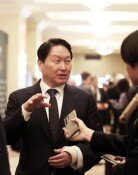[Editorial] Lies and Statistics
From the start of the year, Cheong Wa Dae has made highly political statements arguing that aggravating social bipolarization is a time bomb in Korea which demonstrates its intention to raise taxes. Based on an analysis of statistics, experts and research institutes came up with a different approach viewing that the problem is not bipolarization, but growing poverty among low-income classes, which can be addressed by emphasizing growth. The statistics used came from the National Statistical Office (NSO), which handles the governments statistical data.
Was the NSO simply unaware of the facts found out by the private institutes? It should be either that the NSO lacks skills to conduct in-depth analysis of statistics or that it failed to fully utilize the data that had been collected using tax money. It is also possible that the NSO deliberately turned a blind eye to the truth behind the numbers for political interests.
The ruling Uri Party claimed that the proportion of vocational high school students receiving special advantages in college entrance examinations must be raised to five percent, as if it was showing mercy to such students, all of whom it considered poor and less intelligent. There were controversies surrounding this issue, but neither the Ministry of Education and Human Resources nor the NSO released any statistics or documents to help the publics understanding. Moreover, the NSO has frequently pointed out to ministries, including the Ministry of Government Affairs and Administration, for their misuse or misappropriation of statistics. After all, the government not only lags behind advanced nations in statistics development, management and utilization, but also has the tendency to deliberately distort data.
Nevertheless, the government is now trying to amend the statistics act to allow government interference with private institute statistics. This means that the government is going to reintroduce the private statistics institute authorization system which was abolished seven years ago as part of regulatory reforms. Once the system is restored, important national statistics produced by private institutes will be placed under the governments control, and the data that is not in compliance with government policy might be discarded in the name of statistics quality control.
There is something else the government needs to do regarding statistics. It is urgent that the government develops an advanced statistical system that allows realistic assessments of the present and predictions of the future. In addition, rather than selecting the data that suits its political appetite, the government should release statistics that can give the public a comprehensive grasp of current issues. Before discussing the credibility of statistics, it should examine and improve its own statistical data. A government that lies with statistics is not the government the people want.







